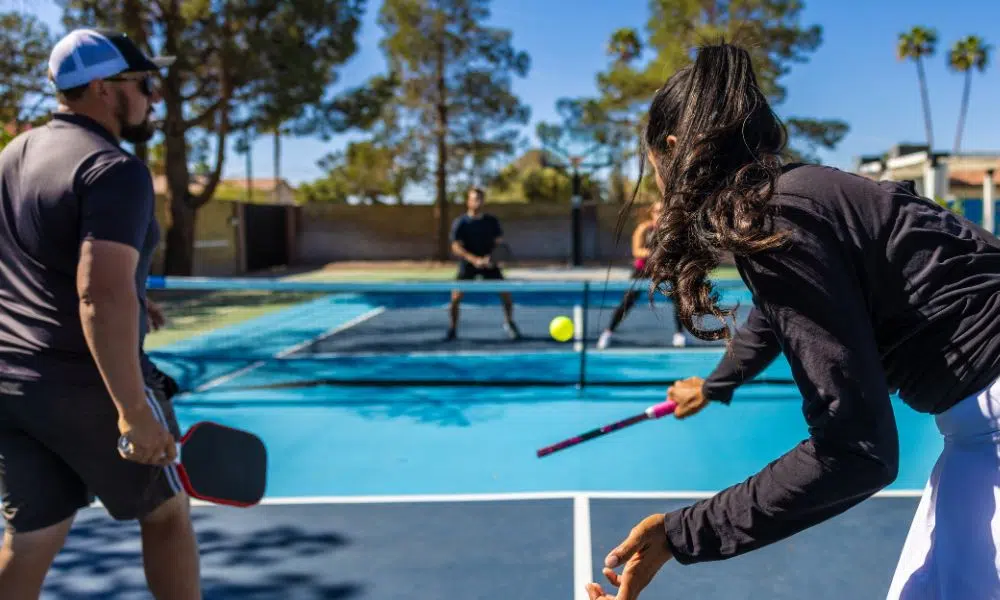Educational 16 December 2024

Pop, pop, pop… pop. Take a walk in a public park in North America, and you’ll likely hear it— the rhythmic sound of a plastic ball meeting a fiberglass paddle. The percussive popping can only be one thing: pickleball. Now the fastest-growing sport in the U.S., pickleball has captured the hearts of players young and old, bringing communities together in recreation and competition.
But as the sport gains popularity, so does the demand for facilities that accommodate more players and longer hours of play. Evening games are particularly appealing in warm-weather locations, providing relief from the midday sun and accommodating daytime work schedules. Bright, reliable court lighting is essential not just for extending usability but player visibility, safety, and enjoyment.
This is where solar lighting shines. Whereas conventional grid-powered lighting can be expensive, disruptive to the environment, and hard to maintain, today’s solar lights can provide the same output without extensive electrical infrastructure or energy costs.
For parks and recreation departments looking to expand playing hours and enhance safety for pickleball players—as well as a wide range of other outdoor sports—solar lighting is a practical, economical choice.
There are significant drawbacks to lighting sports courts with conventional lighting. Installing these systems generally requires trenching to lay electrical cables and wires, which can be costly, time-consuming, and environmentally disruptive. For many parks, the upfront expenses are prohibitive, forcing parks departments to make cuts elsewhere or limit facilities to daytime use only.
After installation, grid-powered lights strain budgets further due to frequent maintenance and ongoing energy costs. Parks with nightly lighting—especially those at high latitudes with long winter nights—can pay thousands of dollars annually in utility bills, and rising rates only add to the issue, making it difficult to manage operating budgets and plan for the future. Over time, the cost of grid-tied lights can easily surpass any initial savings on the product.
Solar lighting addresses these challenges with an efficient, sustainable, and free power source: the sun! Unlike conventional systems, solar lights are fully autonomous and don’t need to be connected to the grid, making installation much simpler and less invasive. Solar lights like Sol’s can be installed virtually anywhere, preserving the integrity of the park landscape and significantly reducing installation costs.
Once installed, solar lights can provide the same light levels as grid-tied lights, easily meeting standards set by organizations like Pickleball USA. High-efficiency LED fixtures offer consistent, uniform illumination, ensuring the recommended 30-50 footcandles and max/min uniformity ratio of 2.0. Solar lights are also incredibly low maintenance, with long-lasting LEDs and durable, high-density batteries providing years of reliable performance (so long as the system has been appropriately sized for the location).
Many modern solar lights also feature Dark Sky-friendly LED fixtures that reduce light pollution by focusing illumination solely on the court. This design protects natural environments like parks, preserves ecosystems, and minimizes disruption to wildlife. By reducing glare, light trespass, and skyglow, solar lights enhance player visibility while maintaining the beauty of the night sky.
As pickleball grows, ensuring courts are usable, safe, and enjoyable for evening play is critical. Solar lighting offers an affordable, sustainable solution that meets lighting standards while reducing energy costs and environmental impact. By eliminating the need for complex electrical infrastructure, solar lighting makes upgrading these facilities easier and more affordable than ever.
Whether you’re adding new courts or enhancing existing ones, our team is available to advise you on your project.
